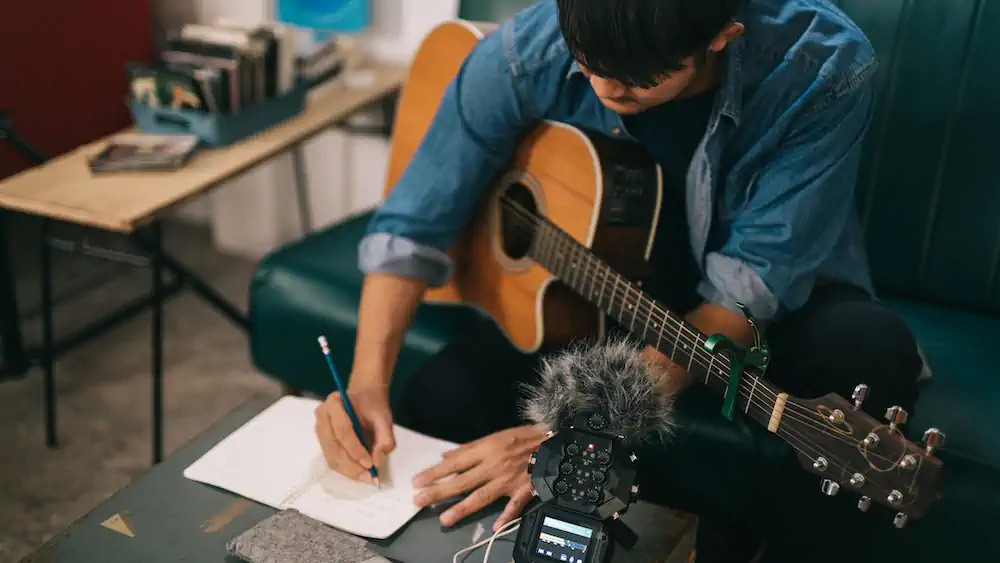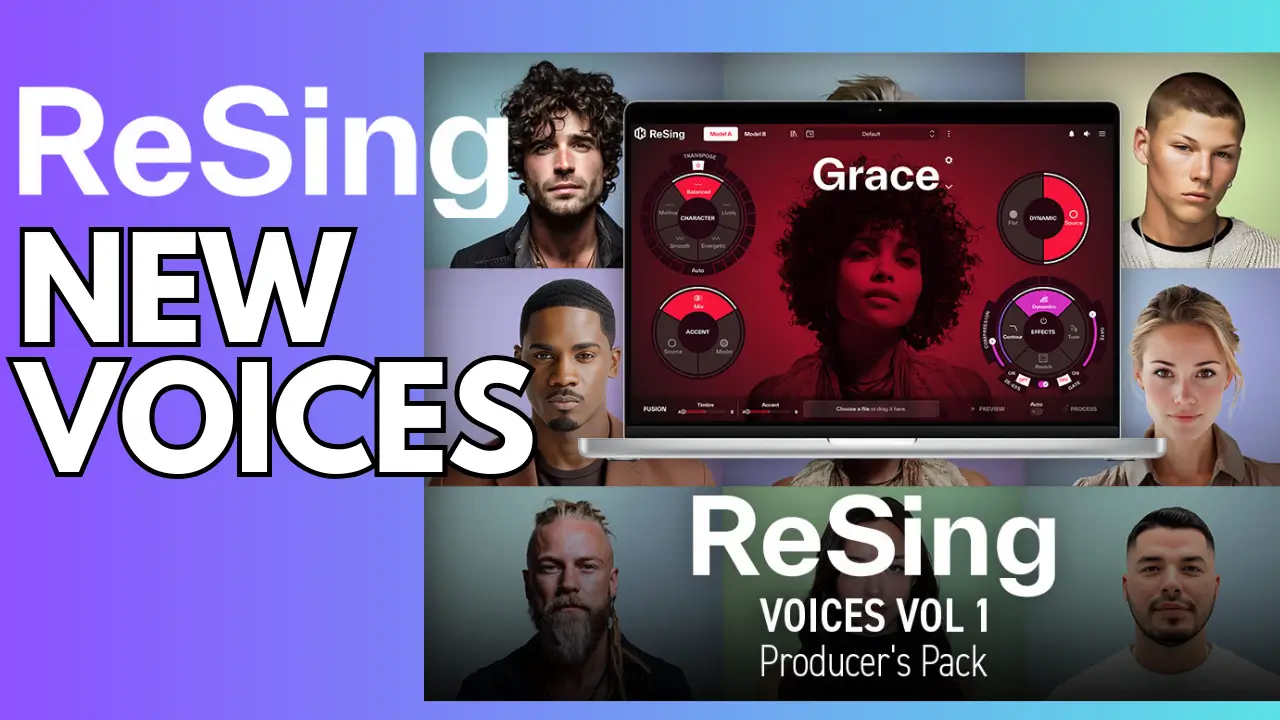I get it – you’re staring at your instrument, notebook open, pen ready, but the music just isn’t flowing. If it’s any comfort, you’re not alone. Many songwriters, from the hobbyists to the legends, have sat right where you are, grappling with a lack of inspiration. This is a universally shared struggle, and it spares no one in the creative fields.
Songwriting, much like any other creative endeavor, ebbs and flows. And when the tide is out, the barrenness can leave you feeling helpless and frustrated. What is it exactly that turns a once bubbling spring of ideas into a parched well? In this article, we seek to define and understand the invisible barriers that keep you from expressing your thoughts and emotions through music.
The purpose of this discussion is not just to identify the problem, but to establish a guide to overcoming it. By understanding the root of this creative impasse, we can develop a strategy to not only get the inspiration flowing again but also to maintain a steady stream in the future.
Related Posts:
- Experimental Songwriting Techniques
- Using Music Theory To Spark Creativity
- 51 Useful Songwriting Tips for Beginners
- How AI Is Revolutionizing The Songwriting Process
Understanding the Causes of Creative Dry Spells

As a songwriter, you know that some days the muse just doesn’t show up. It’s not just you, even the greats have stared at a blank page. Here’s what could be happening when the well of inspiration seems to dry up.
First, consider psychological factors. Stress, anxiety, or a packed schedule can stifle creativity. The pressure to create can become the very block that stops ideas from flowing. Mental fatigue clouds the mind, making fresh thoughts elusive.
Then there’s your environment and lifestyle. Maybe your workspace isn’t inspiring, or perhaps you haven’t had a change of scenery in a while. Lack of variety in daily experiences can lead to a monotonous output. Even your sleep patterns and diet play a role, they affect cognitive function, which in turn impacts creative thinking.
Lastly, let’s talk about mental wellbeing. Just like physical health, your mental state is crucial to creativity. Ignoring it can lead to a slump. Creative work is emotional labor. When your emotional reserves are low, it can hinder your ability to tap into your creative spirit.
In the next section, I’ll share how to light that spark again. You’ll find out about different sources of inspiration and some practical daily habits to keep your creative juices flowing.
Strategies for Reigniting the Songwriting Spark

Every songwriter knows that a creative block is just a curtain waiting to be lifted. Finding that spark to push it aside often means looking in unexpected places or changing familiar routines. Here are actionable methods that can help songwriters rediscover their inspiration and get back to composing compelling music.
First, drawing from a variety of sources can bring a fresh outlook. Art, nature, and personal experiences still stand as timeless muses. Try taking a deep dive into a new album or genre of music. Sometimes inspiration lies not in music itself but in other art forms, so consider visiting a museum, reading a book, or watching a film. Immersing in different creative worlds can infuse new life into songwriting.
Daily practices make a monumental difference. Routine, as mundane as it might seem, builds a solid foundation for creativity. Start each day with a writing prompt or a musical exercise, no matter how uninspired you feel. It’s not so much about waiting for inspiration as it is about being prepared when it strikes. As the saying goes, genius is one percent inspiration and ninety-nine percent perspiration.
Don’t underestimate the power of collaboration. Working with others can turbo-charge your creativity. Co-writing sessions or just talking about ideas with another artist can shine a new light on your work and introduce perspectives you might not have considered.
Adjusting your mindset towards creativity is crucial as well. View each ‘block’ not as an obstacle, but as an opportunity to replenish your creative well. Accept that not every session will produce a masterpiece, and acknowledge every attempt as a step forward in your songwriting journey.
Navigating Through the Emotional Landscape of Songwriting

Creativity is not just about raw talent or technical skill; it’s deeply intertwined with our emotional states. Songwriting can be a vulnerable and introspective endeavor, one that demands exploration into personal experiences and feelings. Understanding the emotional components of creativity is essential in moving past inspiration blockages.
Self-doubt can be a significant barrier. Many artists struggle with the inner critic that questions their talent and the value of their work. Recognizing that this is a common experience among creatives can be comforting. Instead of wrestling with self-doubt, learn to acknowledge its presence and redirect those energies into the writing process itself.
Building and maintaining confidence requires patience. The path to a great song is often non-linear and riddled with setbacks. Accepting that and giving yourself the grace to make mistakes and learn is a part of growth. This mindset not only fosters personal development but also clears the way for creative ideas to surface.
To conclude, incorporating practices for emotional well-being is as important as any technical exercise in songwriting. When you face a wall in your creative process, take a moment to reflect on how you handle your emotions. Foster a supportive environment for yourself, one that encourages resilience and perseverance. The stages of songwriting are impacted by our emotional landscape, and learning to navigate it can make all the difference.
Staying Motivated and Productive: Beyond Inspiration

I understand that waiting for a stroke of genius can be frustrating. But let me share a secret: the most successful songwriters don’t just rely on inspiration – they work on their craft regularly, discipline in hand.
Consistency is the key. Establish a routine that includes time for writing, even if it’s just a few lines each day. This habit ensures that you stay in touch with your creative side and can make improvements little by little.
Setting achievable goals can also transform your songwriting journey. Start with small, tangible objectives, like completing a verse or finding the right melody for a chorus. Celebrate these victories; they’re signposts of your progress.
Remember, constraints breed creativity. They compel you to think differently and can lead to innovative songwriting. Limit your chord progression or write a song using only a few notes. These exercises can spur new ideas you might have never discovered.
And lastly, if the inspiration well seems dry, don’t get discouraged. It’s an inevitable part of the creative cycle. Even when ideas are scarce, your dedication to the craft can keep the wheels turning until the next wave of inspiration hits.





Leave a Reply